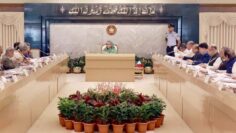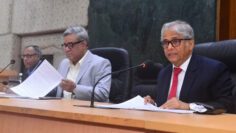Sri Lanka cabinet okays step to ban cattle slaughter
PBC News: Sri Lanka’s cabinet of ministers have approved another step in its move to ban cattle slaughter in the country in what it said is an effort to increase local agriculture and dairy production, reports economymynext.com.
However, rights activists have criticised the move claiming that it targets a particular community.
The ban on cattle slaughter was originally approved by the Sri Lanka Podujana Peramuna (SLPP)-led government two months after it won the 2020 parliament election in a landslide.
In September last year, the cabinet approved the ban and a proposal to amend the laws and regulations applicable to it. A proposal to amend laws passed by ocal government institutions in relation to cattle slaughter was also approved.
The government had to amend five acts/ordinances including the Cattle Slaughter Ordinance before tabling the proposal in the parliament.
The cabinet this week granted approval to the consolidated resolution tabled by Prime Minister Mahinda Rajapaksa and the ministers of Public Services, Provincial Councils and Local Government and Agriculture to publish the amended bills drafted by the Legal Draftsman in the government gazette as notifications and thereby table it in parliament.
The move was seen as a mirror image of India’s ruling nationalist Bharatiya Janata Party’s decision to ban cattle slaughter in most Indian states controlled by the party. India is the top beef exporter in the world after Brazil, Australia, and the United States. Most Hindus consider the cow a sacred animal.
The move angered farmers as sale of cattle for slaughter was completely banned and farmers were unable to sell their cattle, which was earlier considered a cashable asset.
Analysts say the SLPP leaders think the cattle slaughter ban is politically rewarding at a time of easy vigilantism.
However, there could be economic implications across the board on the environment, the rural economy, and the import of beef: issues that should have been addressed before taking a hard line, analysts say.
Aritha Wickremesinghe, a human rights activist said in a Facebook post on Tuesday (19) that the move is another distraction to hide people’s economic struggle.
“This decision (which is yet to come into law), is not about helping the dairy industry – because it clearly doesn’t. Milk will become more expensive as a result, in a country where it is already unaffordable,” he said.
“This is called distraction – against the enormous economic struggles for people. And racism – against a cattle slaughter industry dominated by Muslim butchers.”
“What the Government needs to approve and pass is the Animal Welfare Bill. A law gathering dust for decades and which will ensure humane slaughter of animals, including chicken, fish and goats – who suffer incredibly,” he said.


















